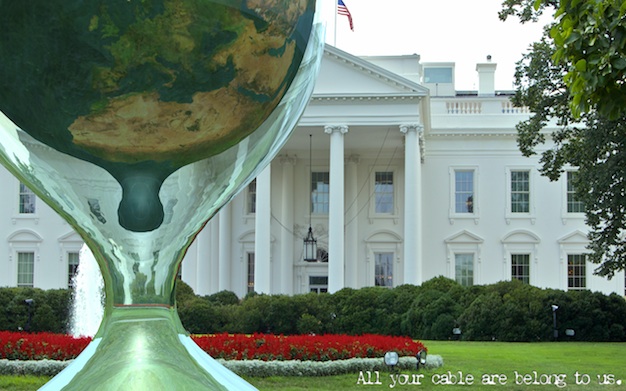 El País: EE UU veía al actual jefe de las FARC como el hombre más dispuesto a firmar la paz (U.S. saw the current head of the FARC as a man more willing to make peace)
El País: EE UU veía al actual jefe de las FARC como el hombre más dispuesto a firmar la paz (U.S. saw the current head of the FARC as a man more willing to make peace)
"Alfonso Cano, el jefe de las guerrillas de las FARC, el hombre más buscado de Colombia, anda estos días con el Ejército pisándole los talones. El presidente de Colombia, Juan Manuel Santos, declaró el jueves 17 de febrero que los militares andan "respirándole en la nuca". Poco tiene que ver ahora este Alfonso Cano con el que ingresó en la guerrilla a finales de los setenta y se hizo un hueco entre sus dirigentes cuando Manuel Marulanda, alias Tirofijo, ejercía de jefe indiscutible en la montaña. En aquella época Alfonso Cano era la persona en la que Estados Unidos depositaba sus esperanzas de paz, según confirman los documentos del Departamento de Estado filtrados por Wikileaks. (Alfonso Cano, the leader of the guerrillas of the FARC, Colombia's most wanted man, come these days with the army at his heels. The president of Colombia, Juan Manuel Santos said on Thursday Feb. 17 that the military walk "breathing down your neck." Has little to do now this Alfonso Cano with the one who joined the guerrillas in the late seventies and obtained his position between the leaders when Manuel Marulanda, alias "Sureshot", was the undisputed boss on the mountain. At that time, Alfonso Cano was the person in which the United States deposited their hopes for peace, as confirmed by State Department documents leaked by Wikileaks.)"
 El País: Estados Unidos presionó a Uribe para hacer una limpia en sus servicios de espionaje (U.S. pressure on Uribe to make a clean intelligence services)
El País: Estados Unidos presionó a Uribe para hacer una limpia en sus servicios de espionaje (U.S. pressure on Uribe to make a clean intelligence services)
"Estados Unidos presionó en 2009 al entonces presidente de Colombia, Álvaro Uribe, para que hiciera una limpieza a fondo en el Departamento Administrativo de Seguridad (DAS), la agencia de espionaje que depende directamente del presidente del país. Los cables del departamento de Estado filtrados por Wikileaks revelan cómo el embajador de Estados Unidos en Bogotá, William R. Brownfield, amenazó al entonces vicepresidente Francisco Santos con endurecer las relaciones de su país con los servicios secretos colombianos. Santos reconoció que Uribe no comprendía a fondo la gravedad de la crisis y pidió al embajador que hablara directamente con Uribe para convencerle de la necesidad de tomar medidas efectivas respecto al DAS. (The United States pressed in 2009 the then President of Colombia, Alvaro Uribe, to do a thorough cleaning at the Department of Administrative Security (DAS), the spy agency that reports directly to the president. The State Department cables leaked by Wikileaks reveal how the U.S. ambassador in Bogota, William R. Brownfield, threatened the then Vice President Francisco Santos to toughen his country's relations with the Colombian secret services. Santos acknowledged that Uribe did not understand fully the gravity of the crisis and asked the ambassador to talk directly to Uribe to convince of the need to take effective action on the DAS.)"
Aside from its own political and ideological conflicts, in 2004 Pakistan saw itself obligated to join a task force with the U.S. to fight Taliban and Al-Qaeda groups in its northern region. This created a relationship of mutual interests between the Pakistani political elite and U.S. military interests on the region - generally characterized by the hunt for Osama bin Laden and other terrorist leaders. This agreement seemed to complicate problems that already existed in Pakistan, mostly corruption in every sense, and a reliance on U.S. support also was originated. Based on leaked cables of U.S. Diplomacy, we selected some cases where this co-dependence shows its weaknesses and incapabilities to establish an honest and democratic Pakistan.
U.S. DRONE ATTACKS
Current time and date in Wisconsin:
 Wisconsin? Yes, Wisconsin... WL Central has been covering all the protests worldwide. WL Central has been looking at countries regardless of whether there are WikiLeaks cables handy. And at 5:44 PM, hundreds if not more than a thousand people are in the capitol about to be removed by police.
Wisconsin? Yes, Wisconsin... WL Central has been covering all the protests worldwide. WL Central has been looking at countries regardless of whether there are WikiLeaks cables handy. And at 5:44 PM, hundreds if not more than a thousand people are in the capitol about to be removed by police.
Many of the people in Wisconsin are inspired by Egypt just like many others in the Middle East and North Africa have been moved to act. And, actually, it's not entirely true that there is nothing out there to color what is happening in Wisconsin, to illuminate the anti-worker anti-union politics that has been spreading throughout the states. If one looks at the following cable 06MEXICO2220, one can infer that the US government views workers that try to wield political power and unions which wage battles against governments as players that could threaten a country's economic stability.
In this cable, ten economic challenges that the next president of Mexico will face are outlined. One of them is "Taking On the Unions without Shutting Down the Country":
12. (SBU) Few major reform proposals will move forward without
some confrontation or deal with the unions representing the
affected industries. Unions gained power and influence over many
decades of working closely with the PRI, delivering votes in
exchange for unaffordable benefits for workers and untold riches
for union leaders. Due to union protections, for example, the
state-owned Mexico City electric utility (LyFC) has what is in
effect its own construction and manufacturing subsidiaries with
some 10,000 employees. LyFC retirees not only retire at full
 The Guardian: A guide to Gaddafi's 'famously fractious' family
The Guardian: A guide to Gaddafi's 'famously fractious' family
"US embassy cables shed light on Gaddafi family – including son Saif al-Islam, who vowed in TV address to eradicate enemies.
The leader of the Libyan revolution presides over a "famously fractious" family that is powerful, wealthy, dysfunctional and marked by internecine struggles, according to US diplomatic cables released by WikiLeaks. The documents shed light on how his eight children – among whom rivalries have sharpened in recent years – his wife and Gaddafi himself lead their lives."
Aftenposten: SECURING ADDITIONAL ALLIED/PARTNER CONTRIBUTIONS TO ISAF IN SUPPORT OF PRESIDENT OBAMA"S UPCOMING ANNOUNCEMENT ON AFGHANISTAN
"When President Obama announces his decision on possible U.S. troop increases for Afghanistan, the impact could be far greater if other Allied and Partner leaders would announce increases of their own either simultaneously or in close succession. Several Allies and Partners have the military capacity to make significant additional contributions, and if they showed the political will to follow through that would send a strong signal of resolve and unity of purpose to the international audience, Al Qaeda and the Taliban. We should use the time between now and the Presidents announcement to engage select Allies and Partners at the highest levels to secure commitments to those additional military, civilian and monetary contributions. Below is a summary of nations that we believe can do more now. Of these countries, we believe Germany, Italy, and the UK are the most likely to respond positively."
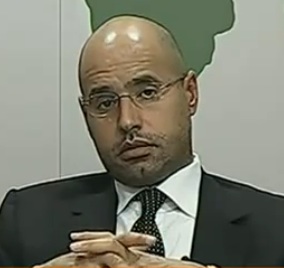 An address from Muammar al-Gaddafi’s son, Saif al-Islam al-Gaddafi, was aired on television in Libya early on February 21. Saif al-Islam told Libyans he had come without a prepared speech and was going to speak from his heart and mind.
An address from Muammar al-Gaddafi’s son, Saif al-Islam al-Gaddafi, was aired on television in Libya early on February 21. Saif al-Islam told Libyans he had come without a prepared speech and was going to speak from his heart and mind.
The address (which you can read here) was given as Tripoli was turning into more of a battlefield. Snipers were firing in Saha Al Khadra. His father’s “thugs” were allegedly going into hospitals and killing Libyans who had been out in the streets and been wounded.
Rumors are circulating that Saif al-Islam was shot. Some of the unconfirmed reports say Saif al-Islam is dead and his father and some from the Gaddafi family has fled. Muammar has gone to Venezuela, some reports allege.
The death of Saif al-Islam is possible, but until there are reports which go beyond unconfirmed, this is largely a distracting story. What Saif al-Islam said in the recorded address that aired on February 20 is much more important.
Saif's Address to Libya
 Aftenposten: READOUT NORTH ATLANTIC COUNCIL MEETING JANUARY 28, 2009
Aftenposten: READOUT NORTH ATLANTIC COUNCIL MEETING JANUARY 28, 2009
"AFGHANISTAN: ISAF Senior Civilian Representative Gentilini said the Afghans were eager for NATO to respond to its proposal for a military technical agreement, sent to NATO in early January. The SCR and several Perm Reps stressed that a MTA with the Afghans could help address the issue of civilian casualties, but many cautioned that the legal difficulties involved in negotiating such an agreement called for the Alliance to proceed with caution. Saying it needed more time to seek instructions, Hungary blocked consensus on a decision that fully filling the Elections Support Force (ESF) should take priority over filling the NATO Response Force (NRF), which would have allowed nations to pull NRF components for use in the ESF. The NAC will revisit the issue next week."
Aftenposten: AMBASSADORS JANUARY 11 MEETING WITH NATO SENIOR ISAF REPRESENTATIVE ON GIROA PROPOSED AFGHANISTAN-NATO MILITARY TECHNICAL AGREEMENT
 Aftenposten: NORTH ATLANTIC COUNCIL READOUT MAY 2, 2007
Aftenposten: NORTH ATLANTIC COUNCIL READOUT MAY 2, 2007
"Afghanistan: Allegations of civilian deaths near Herat seized PermReps, attention as the U.S. and Spain push for NATO to develop a response to such allegations. SHAPE focused attention on increased enemy suicide attacks and the need to counter increasing IED attacks, including through better training and HQ staffing, as well as the heightened enemy interest and build-up in Kabul and environs. Ambassador Nuland urged Allies to focus greater effort on countering IEDs, to do more to train Afghan forces, and to follow U.S. leadership in staffing HQ ISAF. Portuguese Quick Reaction Force (QRF) to deploy to RC-S later in May."
El País: Un exministro peruano pidió colaboración a EE UU para frenar el avance electoral de Ollanta Humala (A Peruvian ex-minister asked to the United States to collaborate on stopping Ollanta Humala's progress before the elections)
"Fernando Rospigliosi, antiguo responsable de Interior con Alejandro Toledo, buscó en 2005 el apoyo de la Embajada en una campaña contra el candidato nacionalista. Los diplomáticos estadounidenses rechazaron la petición. (Fernando Rospigliosi, former responsible of interior with Alejandro Toledo, searcher in 2005 support from the American Embassy on a campaign against the nationalist candidate. The American diplomats refused the petition.)"
(Image Credit: Dali Rău)
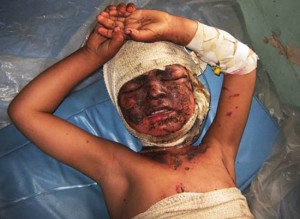 The Norwegian newspaper Aftenposten has published an article on NATO, US, and the Red Cross and the Bala Baluk massacre on May 4, 2009. The article features a cable that shows the Red Cross put together a report that raised significant doubt about military reports on the number of civilians killed. The cable reveals how a PR campaign kicked into gear to sell the idea that the deaths were not intentional and to skew coverage of the event to fit the interests of NATO and US forces in Afghanistan.
The Norwegian newspaper Aftenposten has published an article on NATO, US, and the Red Cross and the Bala Baluk massacre on May 4, 2009. The article features a cable that shows the Red Cross put together a report that raised significant doubt about military reports on the number of civilians killed. The cable reveals how a PR campaign kicked into gear to sell the idea that the deaths were not intentional and to skew coverage of the event to fit the interests of NATO and US forces in Afghanistan.
Muammar al-Gaddafi came to power in Libya on the 1st of September 1969 through a military coup which proclaimed the Libyan Arab Republic. Now he is the longest serving national leader that does not belong to a royal family. His stance on international affairs has mostly been conflictive and aggressive in nature, although after a long list of disputes, such as financing terrorism worldwide or military clashes with the U.S., he moderated his policies seeking collaboration with international corporations, especially with the Bush Administration.
In the early years of his regime Gadaffi set up a system based on what he called Islamic socialism. In practice this meant a system based on popular or direct democracy, where the population would be organized in communes or popular councils so as to personally elect their leaders. The state was built upon these units and controlled the larger companies, leaving the small ones for private ownership. In 1975 he started publishing a recollection of his philosophy in what he named the "Green Book", where he called the system in Libya the Third International Theory, a third way in between capitalism and communism. He also called his form of government Jamahiriya (a term coined by him), often translated as “republic of the masses”, thus officially making Libya the Great Socialist People's Libyan Arab Jamahiriya. After some years Gaddafi stepped down from his leading position in the General Peoples Committee (the ruling governmental organ) and is now considered a spiritual guide under the title of “Brotherly Leader and Guide of the Revolution".
A recent cable, from 2010, announces: “Jordan continues to face some of the most troubling challenges of King Abdullah's 10-year reign.¨ These problems are a deficit of USD 1.43 billion, unstable regional politics, originated from the continuous privilege of rural communities in the East Bank over urban communities with larger Palestinian populations, rigged elections and unequal political rights (09AMMAN813). The cables also reveal that this inequality is created by the government and pushed through by force: “The King's economic and political changes face domestic opposition from tribal leaders and an array of entrenched East Bank interests. The latter include many in the military, security services, and bureaucracy, who enjoy a disproportionate share of the current system”. (10AMMAN329).
According Amman News, Secretary General of the Popular Unity Party Saeed Dhiyab stated that “the clashes were instigated by a group of hooligans, and charged that security forces condoned the violence by not intervening to break out the fights”. The current unrest in Jordan seems to be -once again-, the response of the population towards a whole history of repression and injustice practiced by its government. The clashes started on the 18th of February in the capital, Amman, between protestors calling for political and economic reform, and a group for "Loyalty and Belonging" to King Abdullah II. The clash produced an unconfirmed number of victims. Foreign journalists reported violent threats to confiscate their cameras and the media is still gagged by the government.
The world watches in horror as peaceful protesters particularly in Libya and Bahrain (but also in Iraq and elsewhere) are attacked by police or military forces using live ammunition. Even worse, in Bahrain, firstly at the Pearl Roundabout, not only did those armed forces prevent many injured from being removed from the streets for medical attention, they beat up the paramedics attempting to remove those injured. Here are graphic videos at Wikileaks Central the first of which is another Bahrani incident, (horrific scenes of dead and dying).
There are other incidents not necessarily confirmed but wholly consistent with orders for security forces to use extreme force and deny medical attention to the wounded, including removing the injured from hospital.
In Libya, Human Rights Watch reports at least 84 dead in several cities:
Every day the constant flow of leaks reveals why the people are fighting so hard to tear down the regime and write a new constitution: they show Bahrain as a country based on media manipulation, government lobbying and all sorts of corruption and trafficking of influences.
Policies in Iraq
 La Jornada: Redes sociales, instrumento para detectar fraudes con visas de EU (Social Networks, tool to detect frauds with American visas)
La Jornada: Redes sociales, instrumento para detectar fraudes con visas de EU (Social Networks, tool to detect frauds with American visas)
"Wikileaks reseña este método de investigación; crece el número de solicitudes amañadas. (Wikileaks reviews this method of investigation; the number of fake applications grows.)"
Aftenposten: READOUT NORTH ATLANTIC COUNCIL MEETING FEBRUARY 11, 2009
"AFGHANISTAN: Discussion focused on scheduling strategic instructed dialogues prior to the Krakow Defense Ministers, meeting on the Afghan National Army Trust Fund, crafting an interim response to the Afghan-proposed military technical agreement, and Pakistani proposals for building closer cooperation with NATO. PermReps want to address discrepancies in ISAF and UNAMA counts of civilian casualties with visiting Special Representative of the UN Secretary General Kai Eide next week. Two topics related to NATO,s role in Afghan police development are stalemated in the Military Committee."
Aftenposten: ICRC REPORT ON FARAH CIVCAS INCIDENT STATES 89 CIVILIANS WERE KILLED
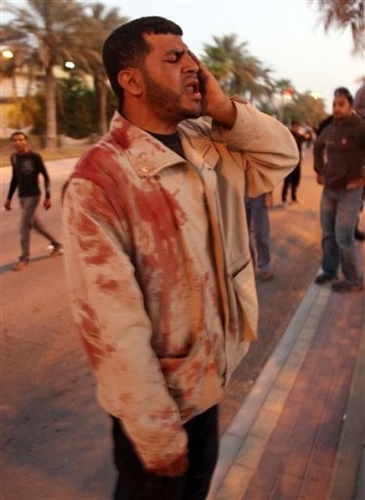 The streets of Bahrain are becoming increasingly violent. Security forces are using live rounds on protesters. Just over a day ago, right before dawn security forces ambushed protesters camping peacefully in the Pearl Roundabout, an area they had turned into their “Tahrir Square.” Many were injured, a few were killed. And, the world is witnessing the brutal discriminatory practices often used by the regime against Shia citizens and activists who dare to criticize the regime or exercise freedom of expression.
The streets of Bahrain are becoming increasingly violent. Security forces are using live rounds on protesters. Just over a day ago, right before dawn security forces ambushed protesters camping peacefully in the Pearl Roundabout, an area they had turned into their “Tahrir Square.” Many were injured, a few were killed. And, the world is witnessing the brutal discriminatory practices often used by the regime against Shia citizens and activists who dare to criticize the regime or exercise freedom of expression.
For years, a monarchy headed by King Hamad bin Isa al- Khalifa has come under sharp criticism for its use of torture. Amnesty International published a report on February 11 titled, “Crackdown in Bahrain: Human Rights at the Crossroads.” And now, WikiLeaks has released several cables detailing the torture of political prisoners and other Bahrainis.
Peter King (R-NY), chair of the US House Committee on Homeland Security, yesterday reintroduced legislation that would extend the definition of espionage to include publishing the names of sources who collaborate with the US military or intelligence services.
King had proposed similar legislation in 2010. Last week three members of the Senate Committee on Homeland Security, led by chairman Joe Lieberman (I-CT), reintroduced a similar bill, known as the SHIELD Act. In US congressional parlance, SHIELD appears to mean "Securing human intelligence and enforcing lawful dissemination."
Many students of the First Amendment have pointed out the dangers to journalism and publishing in the US if the definition of espionage (traditionally understood to involve intentional and interested transmission of information to a foreign power) were to be so broadened. The ACLU argues:
Paul Stephens, Australian ambassador to Sweden, last week formally requested assurances from Swedish Justice Minister Beatrice Ask concerning the treatment of Julian Assange under Swedish law.
In a letter written on the day of final arguments in Assange's extradition hearing last Friday,
Stephens explained that Assange "has been detained in his absence" by a Swedish court on suspicions of having committed "a criminal offence".
"I wish to convey the Australian Government's expectation that, should Mr. Assange be brought into Swedish jurisdiction, his case would proceed in accordance with due process and the provisions prescribed under Swedish law," the Australian ambassador.
He emphasised as well that he expected Assange's case to adhere to "applicable European and international laws, including relevant human rights norms."
Two days ahead of calls to protest the Gaddafi regime in a “Day of Rage” on February 17, members of the Committee of the Families of the Victims of the Abu Salim Massacre came out to protest. Libyan attorney and human rights activist Fathi Terbil, who represents families that had family members massacred in mass prison killings that took place at the Abu Salim prison in 1996, was arrested. Terbil’s arrest led to an eruption of protests ahead of the planned “Day of Rage.”
Protesters showed up to the police headquarters in the city of Benghazi to demand his release. The crowd outside swelled to somewhere between one and two thousand. This response demonstrated how the Gaddafi’s refusal to prosecute those responsible for the massacre of nearly 1200 prisoners in over a decade ago has created a deep resentment among Libyans toward the regime.
The arrest was an example of how the Gaddafi regime treats “regime critics” or dissidents.
 The Guardian: Ugandan gay rights activist 'mocked' at rights seminar
The Guardian: Ugandan gay rights activist 'mocked' at rights seminar
"US embassy cable reports on Uganda's rising homophobia, even at a UN-backed human rights meeting attended by activist David Kato, who was later murdered."
The Telegraph: US wanted 'derogatory' information on Bahrain king's sons
"The US State Department secretly asked its diplomats in Bahrain to report any "derogatory" information about two of the King's sons and evidence of "rivalry" with senior members of the ruling royal family, leaked documents show."
Aftenposten: WOLFOWITZ AND GROSSMAN PRESS TURKS FOR SUPPORT ON IRAQ
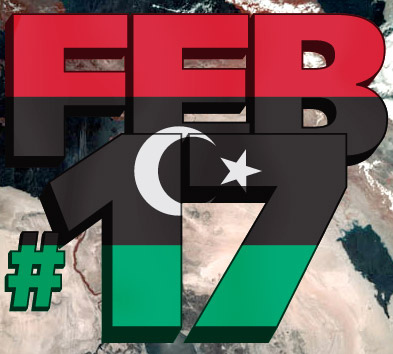 *Author's note: Previously, it had been mentioned that a Part 2 of a feature story titled "WikiLeaks Vindicates Those Behind Unfolding Revolutions" would run before the week was over. Publication has been postponed so proper coverage of cables and news related to Yemen, Algeria, Libya, Bahrain, Iran, Iraq, etc can be focused on instead.
*Author's note: Previously, it had been mentioned that a Part 2 of a feature story titled "WikiLeaks Vindicates Those Behind Unfolding Revolutions" would run before the week was over. Publication has been postponed so proper coverage of cables and news related to Yemen, Algeria, Libya, Bahrain, Iran, Iraq, etc can be focused on instead.
Libyans are mobilizing for a “Day of Rage” today on February 17. Protesters in the early afternoon, according to a member of the Libyan Youth Movement, were reported to be moving to the Security Headquarters in Benghazi. The protests are said to be gaining numbers and are headed for Maydan al Shajara once more, a location that had been the site of gunfire and petrol bombs.
The same individual also reports shortages of medical supplies at Al Bayda hospital and urges international health organizations to help out. And the movement member shared reports of people in Benghazi managed to chase away “pro-government Gaddafi thugs” by throwing rocks at them.
Many in Libya believe ahead of the “Day of Rage” that the Gaddafi regime was planning to threaten Libyans with live fire and the targeting of family members if they participated in anti-government protests. Also, it was reported that Gaddafi was having government employees go protest at pro-Gaddafi rallies, and, if they refused, they would be fired.
Cables released on Libya provide context for the protests that are unfolding. 09TRIPOLI192 from February 2009 titled, “For Ordinary Libyans, It’s the Economy Stupid,” breaks down what might be frustrating Libyans and why Egypt may have been just what they needed to be inspired to take action. The cable suggests Libyans are more interested in economic democracy, not political democracy:
Theme by Danetsoft and Danang Probo Sayekti inspired by Maksimer